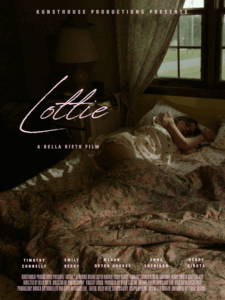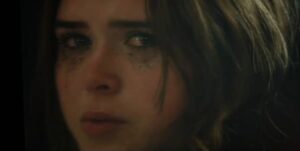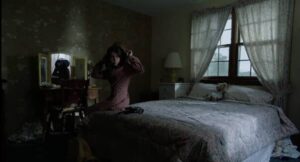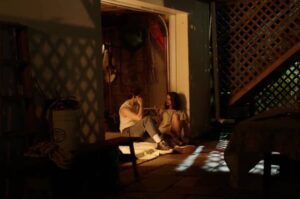Film Review: Lottie (Kunsthouse Productions) Directed by Bella Rieth | Starring Megan Osyen, Emily Berry
(Published: 2025/05/08 at 5:33 pm)
Edition Sixteen- Week Sixteen; Unit 2:
Written by: Jacob West

Film Review: Lottie (Kunsthouse Productions)
Directed by Bella Rieth | Starring Megan Osyen, Emily Berry
From the moment Lottie opens with sun-drenched 1970s stock footage and a bouncy retro soundtrack, it becomes clear that we’re entering a world built with both aesthetic precision and emotional depth. Director Bella Rieth doesn’t just recreate a decade—she uses it as a lens through which we view the raw, untethered inner life of a teenage girl on the verge of unraveling.
Fifteen-year-old Lottie, played with eerie authenticity by Megan Osyen, is restless, isolated, and aching to escape the emotional staleness of her world. On a family vacation that should be idyllic, she finds herself increasingly obsessed with Jonathan, an older pizza delivery boy who becomes a fleeting symbol of being “seen.” But what begins as a teenage crush devolves into a psychological spiral, as Lottie’s grip on reality begins to slip—and we, the audience, slip with her.

Rieth’s direction is quietly masterful. The film alternates between Lottie’s POV, often shot in a home-video-style shaky cam, and a more detached audience perspective. The result is a striking contrast: where Lottie’s camera sees whimsy, color, and the pulse of life, the audience camera captures a washed-out, grey world that reflects her emotional numbness. It’s a visual metaphor that’s not only clever but deeply affecting.
Costuming and set design are pitch-perfect, especially in how they help shape Lottie’s character—her oversized heart-shaped glasses, thrown-on clothes, and expressive but mismatched wardrobe paint a portrait of someone not just out of place, but actively resisting the place she’s in. She’s Belle from Beauty and the Beast, not in a fairy tale, but in a slow-burning tragedy.

And Osyen? She’s a revelation. The British actor’s American accent is flawless, but more importantly, her performance radiates authenticity. Whether Lottie is screaming into a pillow, self-recording monologues, or staring blankly into the distance, Osyen inhabits her with unnerving ease. It’s a performance that’s at once subtle and explosive—one that lingers long after the credits roll.
The cinematography deserves equal praise. Rieth often frames Lottie from afar, visually emphasizing her emotional isolation. In one of the film’s most poignant sequences, Lottie sits alone on a set of steps while her parents argue behind a wooden gate—literally and metaphorically separated from the people who are supposed to protect her. The use of “show, don’t tell” is so finely honed here, each frame loaded with meaning and emotion.
Emily Berry as Lottie’s mother delivers a performance of quiet devastation, particularly during the film’s darker climax. When Lottie attempts to take her own life, Berry’s raw portrayal of maternal grief and helplessness is genuinely heartbreaking.

Lottie is a film of contrasts: colorful and bleak, quiet and violent, tender and disturbing. But above all, it is a deeply human film. Every choice—visual, narrative, or performative—feels considered and intimate. Bella Rieth has crafted something rare: a coming-of-age story that doesn’t just observe adolescence, but lives inside it.
This is a haunting, beautiful film that deserves to be seen. Bravo to everyone involved—but especially to Rieth and Osyen. What a film.
ManualMagazines.com
This website uses cookies to provide you with the best browsing experience.
